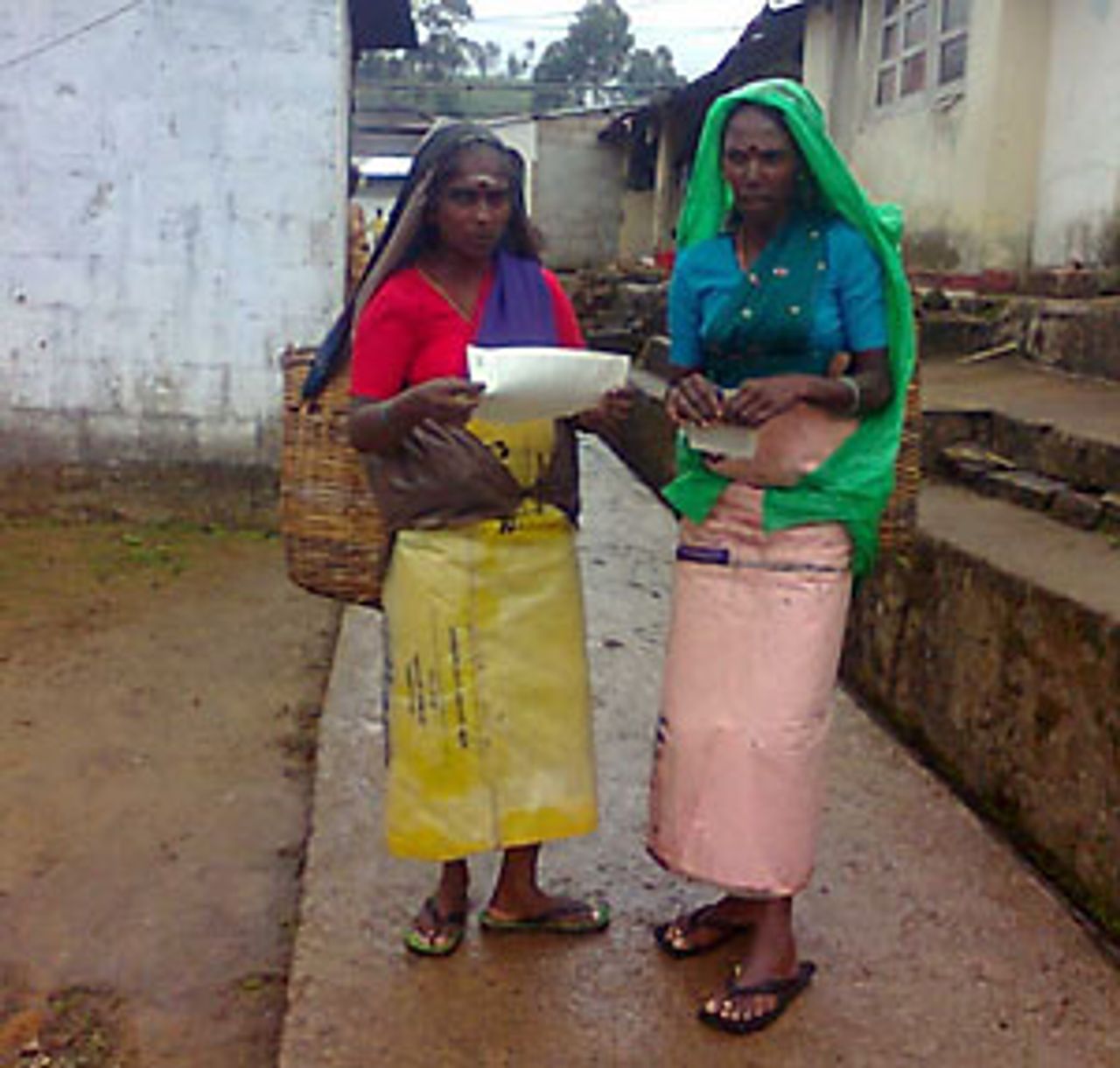Last week the largest plantation union, Ceylon Workers Congress (CWC), signed an agreement with employers binding half a million workers in Sri Lanka’s tea, rubber and coconut plantations to a poverty-level daily wage of just 405 rupees ($US3.50) for the next two years. Two allied unions—the Lanka Jathika Estate Workers Union (LJEWU) and the Joint Plantation Trade Union Alliance (JPTUA)—quickly followed suit.
Workers from several tea estates, who spoke to the WSWS, angrily condemned the deal and all of the unions, including those that nominally claimed to oppose it. In 2006, when the CWC signed a similar sell-out, those unions that opposed the agreement, such as the Up-country Peoples Front (UPF), rapidly caved into government demands to end all strike action and accept the deal.
A group of workers at the Nayabedda estate in Bandarawela told the WSWS: “We were eager to participate in a wage campaign. But no union visited here to organise us. So we had to go to work.”
The local LJEWU branch leader submitted a resignation letter to the union in disgust. “The workers can’t manage even on 1,000 rupees per day. But our leaders have agreed to a pitiful 405-rupee wage. How did they decide on that amount? They didn’t consult us,” he said.
“I have read your Tholilalar Pathai paper before. In those days I had no clarity about what you said. Now I can understand. That is, workers need their own independent political movement,” he said. Tholilalar Pathai was the Tamil language newspaper of the Revolutionary Communist League, the forerunner of the Socialist Equality Party in Sri Lanka.
Mohandas, a worker at the Glenuge estate near Hatton, said: “All the unions vowed that they would not agree to a cent less than 500 rupees. What happened now? [UPF leader] Chandrasekaran and others say that they oppose the deal and will organise a struggle after Deepavali [a Hindu festival in mid-October]. What nonsense? They did the same thing in 2006.
“I have been working on this estate for more than 30 years. I was in several unions over this period but they are useless. They charge 65 rupees a month from each of us as dues. They collect hundreds of thousands of rupees but do nothing for the benefit of workers.”
Plantation workers are one of the most oppressed layers of the working class. Most are Tamil-speaking, the descendents of indentured labourers brought from southern India in the 19th and early 20th centuries by the British colonial rulers. After formal independence in 1948, one of the first actions of the Sri Lankan government was to strip Tamil-speaking plantation workers of their citizenship rights.
Conditions for plantation workers and their families have not fundamentally changed since independence. The exploitative daily wage system means that workers are not paid for days on which there is no work or when they are sick or have family emergencies. Accommodation is in line rooms—a long building divided into small individual rooms—with no amenities. The estates provide limited medical care and education.
 A worker outside his line room on the Balmoral estate
A worker outside his line room on the Balmoral estateA recent survey published by the Environmental Sri Lanka blog found that “86 percent of the estate dwellers live in line rooms and the remaining 14 percent were in twin-cottages, housing schemes or quarters. Among the estate dwellers less than 5 percent had an education up to G.C.E. (O/L) [the final high school exam]. Almost all respondents have sanitary facilities, most of which are in common and a source of water. However, water is not available to individual housing units and it is revealed that in some estates it is hard to find water in dry periods.”
The workers at the Balmoral estate in Agarapathana last week took the initiative of forming an action committee independent of all the trade unions to fight for their basic rights. There are more than a thousand workers on the estate. As in other areas, there is only a small hospital and children have to walk up to 2 kilometres to the nearby school.
Perumal, a Balmoral worker, told the WSWS: “There are 45 families including mine without houses. I am living in a hut covered with polythene. Some live in huts built with old aluminium seats or wood planks. It is difficult to live in those huts on rainy and cold days. The water comes in. Children frequently get sick. No houses have been constructed since 1995 when 25 were built with the support of two NGOs [non-government organisations]. I wrote several letters to the management, but no avail.”
A younger worker said: “Myself, my mother and my elder brother are working, but there is not enough work. After deductions for the Provident Fund, union dues and other things, we get altogether only around 8,000 rupees [a month]. It is not adequate even for food. Generally we eat roti [bread] or rice with one curry. We buy fish or meat only on our payday. Other days we can’t afford even a piece of dry fish.”
On the Glenuge estate, Mohandas explained the situation facing around 200 families: “Conditions have become worse in recent years. Still we live in same line rooms like hen-houses built before 1948. There are not enough toilets. Piped water is supplied twice a day but it is not enough to wash. Workers have constructed two communal washing places by blocking the canal through the estate.”
The estate has a small school with one building and classes going up to grade five. There are only five staff—two trained teachers and three volunteers. There is no sport, no computer and no library facilities. For higher grades, children have to go to Maskeliya or Hatton, travelling between 6 and 28 kilometres in packed buses or small vans.
Mohandas said: “There is a dispensary but no doctors or nurses who live here. A doctor and a nurse visit the estate. The necessary medicines are not available. In the case of a serious illness, patients have to go to the hospitals in Nawalapitiya or Kandy, travelling around 40 to 80 kilometres. There is no ambulance or suitable vehicle to use in emergency situations. When a worker gets sick or a pregnant woman needs to be hospitalised, management gives a lorry.”
Unemployment is a pressing problem in the plantations. S. Mariadas, 23, explained: “I left school in 2005 after sitting for the ordinary level exam. I could not continue my education due to economic hardship. Most children in plantations are compelled to end their education after primary school. A few complete the ordinary level and advance level exams.
 Female workers near their line rooms
Female workers near their line rooms“In the recent Uva provincial council elections, President [Mahinda] Rajapakse promised to provide jobs for all youth on the estates. But it was only a rosy promise to get votes. Some 20 to 30 percent of youth on this estate have no job. So they do odd jobs day-to-day in the area or go to cities like Kandy or Colombo.
“I have done a number of jobs since leaving school. For two years I worked in several shops in Colombo. I was paid only 300 rupees per day. I had to spend 200 rupees for food a day. With my other expenses, I could not save or send any money home. So I came back. Then I completed a tea factory assistant course but still I can not find a job,” Mariadas said.
Retired workers face very difficult conditions. They have no pensions or other benefits except for their limited provident fund. A retired worker, K.Arumugam, explained: “I worked 30 years on the estate and retired 16 years ago. I received only 45,000 rupees from the provident fund. After that I did odd jobs and now I am working at a bungalow in Colombo as a gardener.
“I am now 71 and it is getting difficult to work. Previously we got government food rations. That was stopped in the 1980s and now we don’t get anything. So when you become weak and cannot work any more, you have no other choice but to commit suicide,” he said.
Rampant inflation over the past three years, in part caused by the Rajapakse government’s heavy spending on its communal war, has compounded the difficulties facing plantation workers. The 405-rupee wage deal signed last week does not even compensate workers for the rise in the official cost-of-living index over the past two years since the previous agreement was signed.
It is the appalling conditions on the estates, combined with their bitter experiences with the previous betrayals of the trade unions, which are fuelling a rebellion among plantation workers.
The author also recommends:
Sri Lanka: An appeal to all workers by the Balmoral Estate Action Committee
[22 September 2009]
A socialist program for Sri Lankan plantation workers
[9 September 2009]
